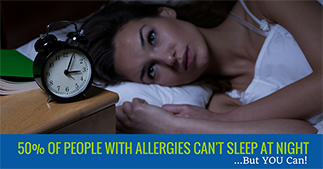
Itchy, watering eyes…coughing…uncontrollable sneezing…irritated nasal passages …is there anything worse than Allergies? Yes: Allergies at night, when you’re trying to sleep.
Whether it’s caused by dust mites in your pillow, animal dander on the duvet or pollen blowing through your window, nighttime allergies can be a major pain.
According to WebMD, “In one study, only 17% of patients with allergies rated their sleep as optimal. About half of all people in the study said allergies and nasal congestion woke them up at night and also made it hard to fall asleep.”
Losing Sleep Over Allergies
Sleep deprivation is more serious than it sounds. In addition to affecting your productivity, mood, and ability to concentrate on important tasks like driving, sleep deprivation is also linked to serious chronic conditions like high blood pressure and heart complications.
The runny nose, nasal congestion and mucous caused by allergies leads to a vicious nighttime cycle: you can’t breathe through your nose, but when you breathe through your mouth, mucous accumulates in the back of your throat, so you cough and snore all night.
Hardly a restful sleep.
How to Reduce Nighttime Allergy Symptoms
The first step is obvious: Consult an ENT to try and find out what’s causing the allergy, if you don’t already know. Dust mites in your bedding are a common culprit if allergy symptoms only appear at night; it might be time to get a new pillow and/or mattress.
If your room is too humid, consider a de-humidifier to prevent mold growth; don’t smoke indoors, or at least use a HEPA filter to purify the air. Finally, your ear, nose and throat doctor can refer you to an allergist for a skin prick test to reveal the source of your allergies.
Once you know what’s causing the allergy symptoms, it’s time to consider treatment.
Non-medication interventions can include:
- Nasal saline rinses that flush the sinuses with salt water – try a device such as a Neti pot
- Drinking more water to thin the mucus
- Drinking warming drinks (without caffeine!) before bed
- Avoiding coffee, tea, caffeinated pop and alcohol for at least 6 hours before bed
- Getting plenty of exercise during the day
- Sleeping with your head elevated to help naturally drain the sinuses
Medications to take can include:
- Antihistamines to help control sneezing
- Decongestants to relieve stuffy nose
- Inhaled nasal corticosteroids (nasal spray) to address all allergy symptoms, including swollen mucous membranes
- Benadryl, an antihistamine that also helps cause drowsiness
- CPAP (continuous airway pressure) mask, if your allergies are compounded by sleep apnea
Need Relief from Allergies to Sleep at Night?
If you want to be among the 50% of allergy sufferers who aren’t kept awake at night by their allergy symptoms, your first move should be to call an experienced ENT. For over 10 years, Dr. Nguyen has specialized in nasal, allergy and sleep conditions, and has helped hundreds of people get the relief they need, and the restful sleep they crave.
Book an assessment with Dr. Nguyen at Houston Sinus & Allergy, and start breathing easier.
Share Tweet Email If you’ve been looking for a permanent treatment for snoring that doesn’t involve surgery or sleeping with a medical device, Elevoplasty® treatment is an option you may wish to consider. What Is Snoring? Snoring is the rattling sound which occurs when a patient breathes in air and the relaxed tissues of the throat vibrate. […]
Share Tweet Email It’s summertime, and the living is sneezy if you’ve got allergies. You might be tempted to lock yourself in an air-conditioned room for the next three months. Turning into a hermit isn’t the answer. You can enjoy an allergy-free summer – read on for more details. Track Your Triggers Allergies are caused […]
